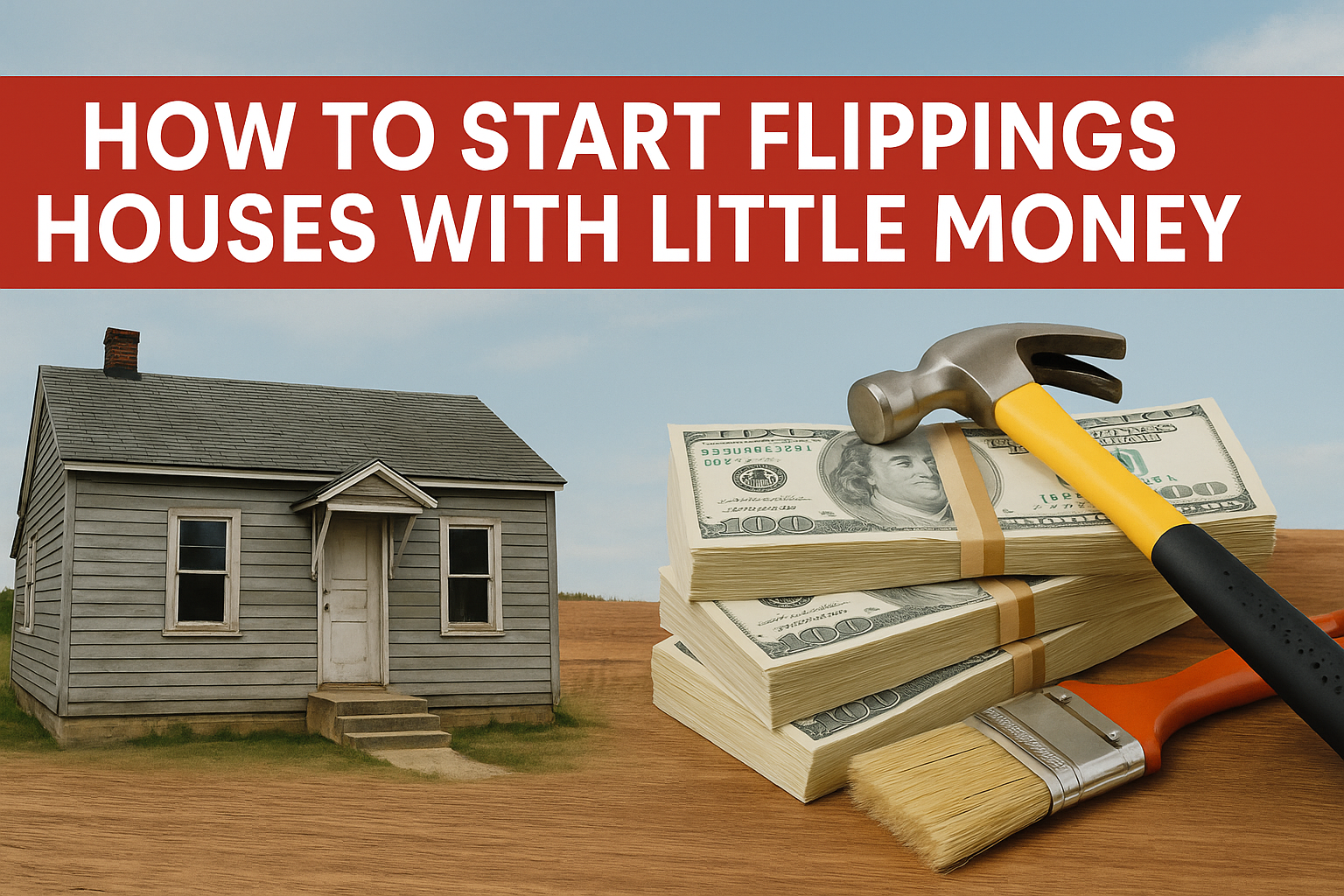How to Start Flipping Houses with Little Money (Even If You're Brand New)

If you’ve been dreaming about real estate profits but feel stuck because you don’t have deep pockets, here's the truth: learning how to start flipping houses with little money is not only possible—it’s one of the smartest ways to break into real estate investing. The key is using strategy over savings and understanding how to structure deals that require minimal cash out of your own pocket.
In this guide, you'll learn the exact steps you can take to flip houses without a big bankroll—and how to do it smart, lean, and profitably. Whether you're a first-time house flipper or an investor on a budget, this article lays the groundwork for your success.
1. Find Low-Cost Properties in Motivated Situations
To start flipping houses with little money, your first move is targeting the right properties. You want homes with upside potential, not just a low sticker price.
-
Look for distressed sales: Foreclosures, short sales, and tax-delinquent properties can be goldmines if handled properly.
-
Go off-market: Absentee owners, inherited homes, and landlords looking to offload headaches are often open to flexible deals.
- Use “driving for dollars”: This old-school tactic is still powerful. Cruise neighborhoods for neglected properties and follow up with a letter or knock.
🏠 Bonus tip: Run your numbers conservatively. Successful flippers know it's not about buying cheap—it’s about buying right.
2. Creative Financing Tips: How to Start Flipping Houses with Little Money
One of the most important skills to master when learning how to start flipping houses with little money is creative financing. Because when banks say no, strategy says yes.
Here are a few real-world options:
-
Hard money lenders: Short-term loans based on the deal, not your credit. Ideal if you have a solid plan and exit strategy.
-
Private lenders: Think friends, family, or local investors looking for returns. Offer interest, equity, or a mix.
-
Seller financing: Some sellers will finance the purchase in exchange for steady payments—cutting out the bank altogether.
- Partnerships: You bring the hustle and management; they bring the cash. Split profits fairly and treat it like a business deal.
If your goal is flipping houses for profit, especially as a beginner, these tools can get you into deals you thought were out of reach.
3. Focus on High-ROI, Low-Budget Repairs
You don’t need to gut a house to make a profit. In fact, most successful beginner house flippers stick to cosmetic upgrades that make a big impact.
Think:
- Fresh paint inside and out
- Refinished floors or new carpet
- Updated light fixtures and hardware
- Kitchen cabinet refacing and new appliances
- Modern bathroom mirrors, vanities, and faucets
💡 Pro Tip: Always aim to improve the perceived value without overspending on unnecessary renovations. It’s how smart flippers stay on budget and boost resale value fast.
4. Know the Rules—Before You Start Swinging Hammers
Flipping isn’t just about buying low and selling high. It involves regulations, timelines, and disclosures—especially if you're aiming to resell quickly.
-
The FHA 90-Day Rule limits your ability to resell to FHA buyers until you’ve owned the home for at least 90 days. Learn more about it from Rocket Mortgage’s FHA flip guide.
-
Permits and inspections are often required for structural or major system work. Don’t skip this step—it can cost you big.
- Holding costs (insurance, utilities, taxes) add up fast. Keep timelines tight and plan your exit before you buy.
The more you know upfront, the fewer profit-killers you’ll run into later.
5. Build a Lean, Reliable Team
You might be starting out solo—but that doesn’t mean you should do everything yourself. Start building your flipping team early:
- A licensed contractor or handyman
- A real estate agent who works with investors
- A title company familiar with investor transactions
- An investor-friendly lender or mortgage broker
- A property inspector you trust
This crew can help you move fast, spot red flags, and get across the finish line with fewer surprises.
6. List, Market, and Exit with Confidence
Once the renovations are done, it’s time to sell. Make sure you're set up to win:
-
Stage the home: If the budget allows, staging increases buyer interest and sale price.
-
List at the right price: Use comps, not hope, to set your number.
- Use strong listing photos: This is your first impression—don’t skimp.
If you followed a solid budget and timeline, you should walk away with a tidy profit—and the momentum to move on to your next flip.
🎯 Ready to Flip Smart—Not Just Fast?

Grab your FREE copy of the Fix and Flip Field Guide
This no-fluff, action-first PDF breaks down 10 must-know tips every beginner flipper should master before signing contracts or swinging hammers.
Inside you'll learn:
- How to use the 70% Rule to protect profits
- Why building your team before buying is critical
- What design choices attract serious buyers
- How to avoid time-wasting, budget-busting mistakes
👉 Download it now and start your first (or next) flip with clarity and confidence.
Final Thoughts
Learning how to start flipping houses with little money is about using what you do have: creativity, drive, and access to knowledge. Focus on smart strategies over big budgets. Start small, partner wisely, and learn fast.
If you’re ready to go from curious to confident, your journey starts with taking action. Grab the free guide, scout your first deal, and commit to learning as you go.
Related pages you might like
House Flipping Tips for Beginners on a Budget
How To Flip Vacant Land For Profit
Cashing in on Pre-Foreclosures and Short Sales
Home > Real Estate Articles >> Flipping Real Estate >> How to Start Flipping Houses with Little Money

